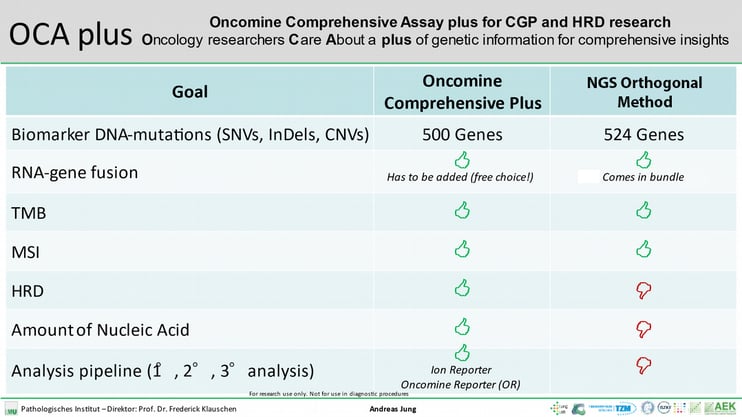Our OncomineWorld event in 2021 brought thousands of professionals together from around the world to advance our understanding of next-generation sequencing (NGS) in precision oncology research. By enabling simultaneous, comprehensive genomic profiling (CGP) of multiple biomarkers in a single assay, NGS
is propelling research forward in a multitude of ways.

Andreas Jung, PhD
Professor for Molecular Pathology,
Head of Unit Tumormorphogenesis & Molecular Pathology,
Institute of Pathology, University of Munich
Dr. Andreas Jung, Professor of Molecular Pathology, University of Munich, presented the benefits of CGP and shared how they utilize it in their lab for the detection of homologous recombination deficiency (HRD). He began with a brief overview of HRD, why it’s important in oncology research, and the current methods of detection. After making the case for the signatures TMB (tumor mutation burden), MSI
(microsatellite instability), and HRD as NGS biomarkers, Dr. Jung discussed why having more genetic information that includes small genomic changes (SVV, del, ins, delins), translocations/ fusion, signatures (LOH, MSI, TMB) is valuable to oncology researchers.
Dr. Jung evaluated the Oncomine Comprehensive Plus assay for the detection of multi-gene biomarkers, including (HRD) and mutational signatures. Performance was assessed against the well-established NGS Orthogonal Method. He concluded that the Oncomine Comprehensive Plus assay was preferable to the orthogonal assay in terms of HRD detection, small sample size requirements, and its efficient analysis.

Key Takeaways
View Dr. Jung’s HRD Full Presentation With Q&As
For Research Use Only. Not for use in diagnostic procedures.
A recently published article by the BLOODPAC Consortium details the potential of liquid biopsy in the management of cancer and highlights the barriers to adoption, particularly in underserved populations.
Cancer is one of the leading causes of...
Precision medicine is rapidly changing our understanding of cancer research and treatment decisions. These breakthrough, personalized treatments hold promise even for patients with historically hard-to-treat diseases, like lung or breast cancer. But
Dr. Eric Vail is Director of Molecular Pathology, Cedars-Sinai Medical Center,Los Angeles, California
Can you please introduce yourself and your laboratory?
I'm the director of the Cedar Sinai Medical Center Molecular Pathology Laboratory, which...